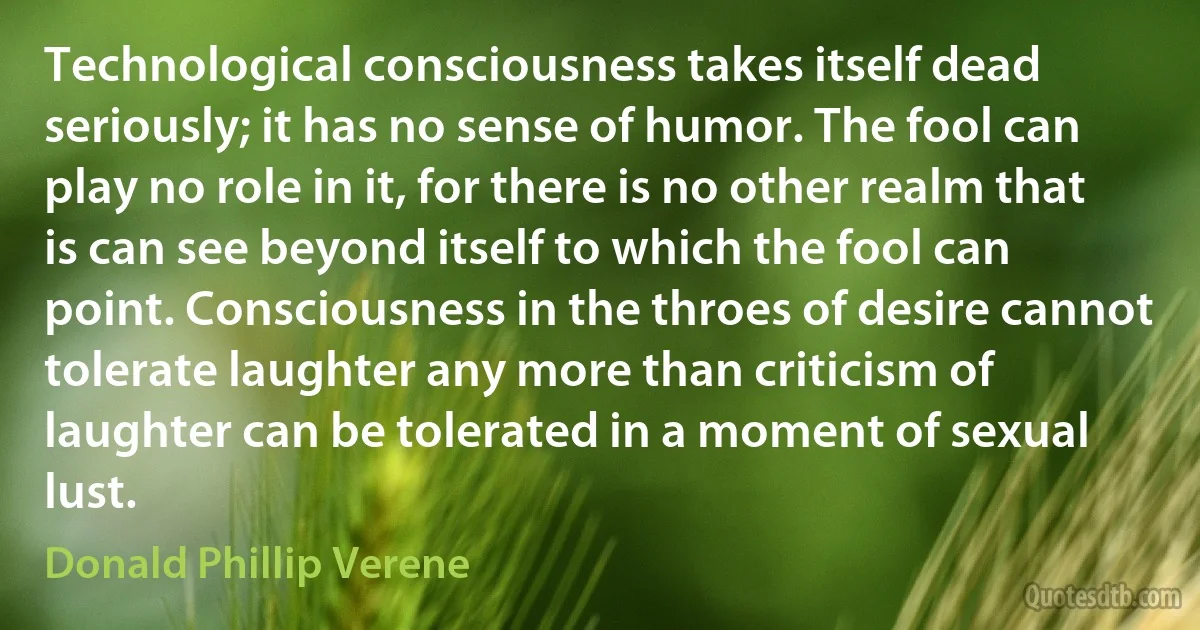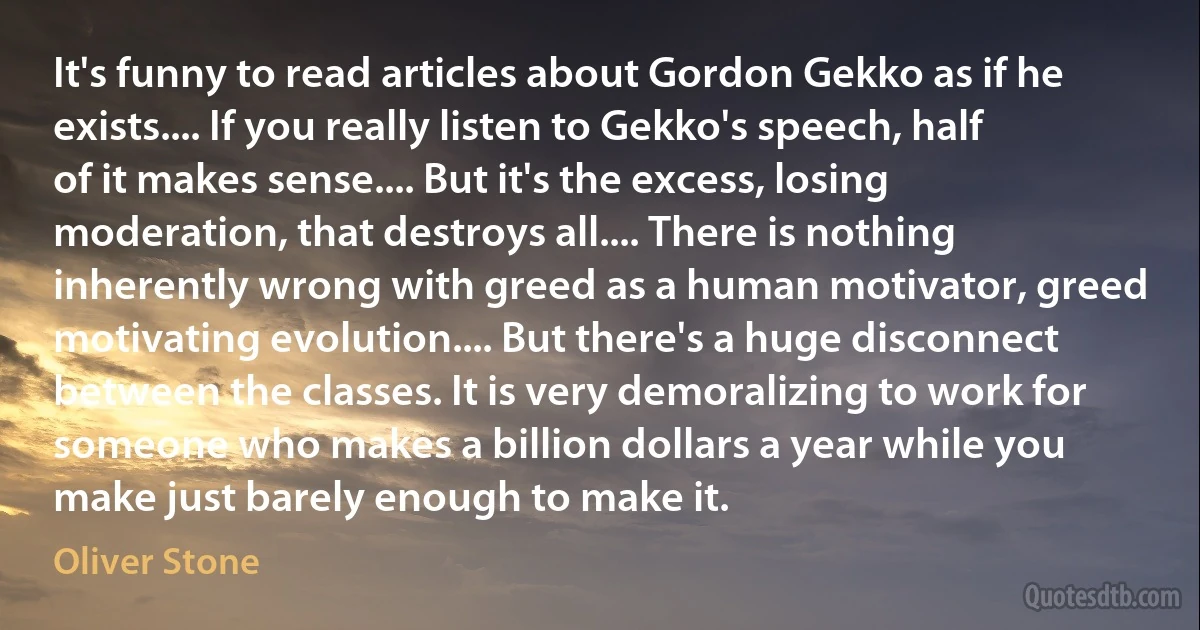Sense Quotes - page 100
To tell the truth, I myself never quite feel that I know what I am talking about - if I did, and when I do, the thing written seems nothing to me. However, what I do write and allow to survive I always feel is worth while and that nobody else has ever come as near as I have to the thing I have intimated if not expressed. To me it's a matter of first understanding that which may not be put to words. I might add more but to no purpose. In a sense, I must express myself, you're right, but always completely incomplete if that means anything.

William Carlos Williams
I dinnae Tam, ah jist dinnae. Life's boring and futile. We start oaf wi high hopes, then we bottle it. We realize that we're aw gaunnae die, withoot really findin oot the big answers. We develop aw they long-winded ideas which jist interpret the reality ay oor lives in different weys, withoot really extending oor body ay worthwhile knowledge, about the big things, the real things. Basically, we live a short, disappointing life; and then we die. We fill oor lives up wi shite, shite like joabs n relationships, tae delude ourselves intae thinkin that it isnae aw totally pointless. Smack's an honest drug, because it strips away these delusions. It's the only really honest drug. It disnae alter yir consciousness. It jist gies ye a hit and a sense ay well-being. After that, ye see the misery ay the world as it is, and ye cannae anesthaetise yirsel against it.

Irvine Welsh
Nine-tenths of the value of a sense of humor in writing is not in the things it makes one write but in the things it keeps one from writing. It is especially valuable in this respect in serious writing, and no one without a sense of humor should ever write seriously. For without knowing what is funny, one is constantly in danger of being funny without knowing it.

Robert Benchley
Primarily, which is very notable and curious, I observe that men of business rarely know the meaning of the word 'rich'. At least, if they know, they do not in their reasoning allow for the fact, that it is a relative word, implying its opposite 'poor' as positively as the word 'north' implies its opposite 'south'. Men nearly always speak and write as if riches were absolute, and it were possible, by following certain scientific precepts, for everybody to be rich. Whereas riches are a power like that electricity, acting only through inequalities or negations of itself. The force of the guinea you have in your pockets depends wholly on the default of a guinea in your neighbour's pocket. If he did not want it, it would be of no use to you; the degree of power it possesses depends accurately upon the need or desire he has for it,- and the art of making yourself rich, in the ordinary mercantile economist's sense, is therefore equally and necessarily the art of keeping your neighbour poor.

John Ruskin
God is a kind Father. He sets us all in the place where He wishes us to be employed; and that employment is truly "our Father's business." He chooses work for every creature which will be delightful to them, if they do it simply and humbly. He gives us always strength enough, and sense enough, for what He wants us to do; if we either tire ourselves, or puzzle ourselves, it is our own fault. And we may always be sure, whatever we are doing, that we cannot be pleasing Him, if we are not happy ourselves.

John Ruskin
Life as we live it is obviously very brutal, and makes us insensitive, dull, heavy, stupid, and so we may hope through ideas, through ideational mentation, to bring about a certain quality of sensitivity.... But even when we are sharpened and quickened intellectually by argument, by discussion, by reading, this does not actually bring about that quality of sensitivity. And you know all those people who are erudite, who read, who theorize, who can discuss brilliantly, are extraordinarily dull people. So I think sensitivity, which destroys mediocrity, is very important to understand. Because most of us are becoming, I am afraid, more mediocre. We are not using that word in any derogative sense at all, but merely observing the fact of mediocrity in the sense of being average, fairly well educated, earning a livelihood and perhaps capable of clever discussion; but this leaves us still bourgeois, mediocre, not only in our attitudes but in our activities.

Jiddu Krishnamurti
Surely, the violence and the entity who says, "I must change violence into non-violence", are both the same. To recognize that fact is to put an end to all conflict, is it not? There is no longer the conflict of trying to change, because I see that the very movement of the mind not to be violent is itself the outcome of violence.
So, the questioner wants to know why it is that he cannot go beyond all these superficial wrangles of the mind. For the simple reason that, consciously or unconsciously, the mind is always seeking something, and that very search brings violence, competition, the sense of utter dissatisfaction. It is only when the mind is completely still that there is a possibility of touching the deep waters.

Jiddu Krishnamurti
There's something I've been working on for more than a year - maybe it's just an old man's obsession, but I'm trying to find an approach to quantum mechanics that makes more sense than existing approaches. I've just finished editing the second edition of my book, Lectures on Quantum Mechanics, in which I think I strengthen the argument that none of the existing interpretations of quantum mechanics are entirely satisfactory.

Steven Weinberg
I miss those days when people believed in science and common sense as in the Fifties and Sixties. Now fundamentalism and contempt for science seems to be spreading. I believe that religion should be totally separated from the state. That's not the way it is today, not even in Sweden. For hundreds of years we have struggled to achieve a secular society, and now we seem to be going backwards.

Björn Ulvaeus
General systems theory, in a sense, is no news at all, as Von Foerster found out when he attempted to organize a conference of general systems people and anthropologists. In a sense, the situation is comparable to that found by the Committee for the Study of Mankind, in which a committee that included Robert Redfidd tried to get each discipline to consider its relationship to the concept of Mankind. Anthropologists replied, "we are related already," and so they were. Something similar may be said of attempts to date in mathematical anthropology. The kind of information that a computer program can finally provide, on a level of a particular culture, is simply a reflection of how detailed field work has been done, and to the careful field worker, on kinship, for example, it provides no illumination.

Margaret Mead
The student of culture is concerned with a characteristic which man displays more markedly than any other known creature - the ability to transmit what he has learned. In following the procedure I suggest, the learning of Homo sapiens would be treated as a further specialization of the concept of grades, with the recognition that in some species - possibly even in some orders - the ability to learn may represent not only an improvement, in an evolutionary sense, but also an increase in vulnerability. Man's unique, high ability to learn, coupled as it is with a small amount of built-in behavior, represents such a vulnerability.

Margaret Mead



